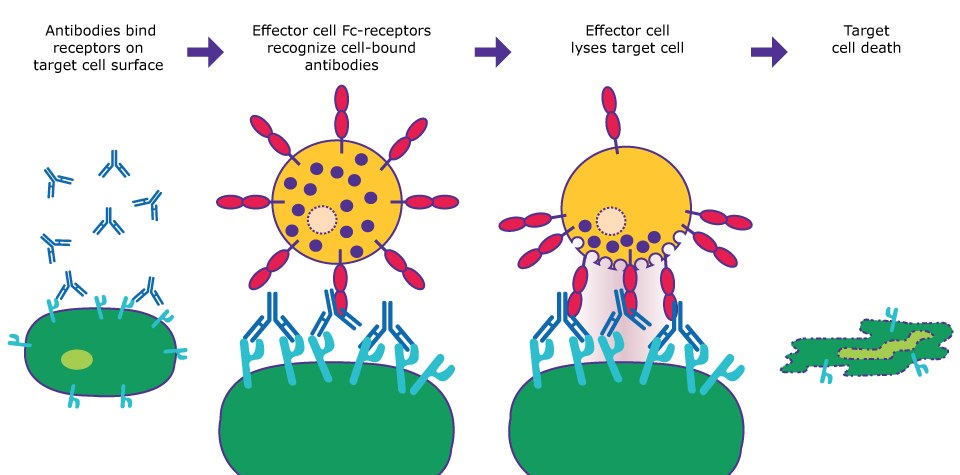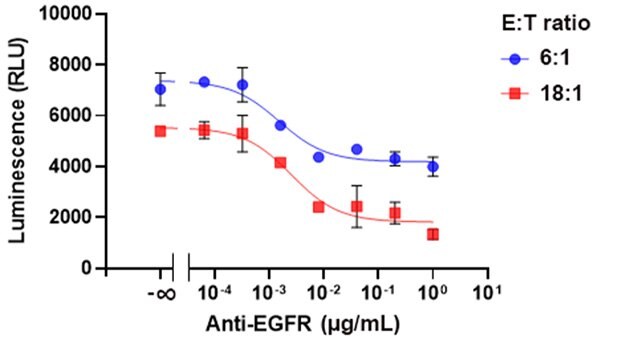ADCC Assay Using BioIVT Cryopreserved NK Cells
Antibody-dependent Cellular Cytotoxicity (ADCC)
Antibody-dependent cellular cytotoxicity (ADCC) is a cell-mediated immune assay commonly used for therapeutic drug discovery. The mechanism of ADCC can be divided into three steps (Figure 1):
- Specific antigens on the surface of the target cell are recognized and bound by antibody.
- The immune cell (effector cell) will recognize and bind to the antigen-bound antibody.
- The effector cell will trigger death of the target cell.

Figure 1.Mechanism of ADCC
In general, natural killer (NK) cells, which can be purified from peripheral blood cells, are used as effector cells. Cryopreserved NK cells provide a more flexible, off-the-shelf solution for researchers performing ADCC assays.
In this study, we explored the use of cryopreserved NK cells in ADCC assays using luciferase-expressing A549 cells as target cells. A human anti-EGFR recombinant antibody was used to bind EGFR on the surface of the target cell and mediate cell death. Cell killing was determined by measuring the change in luciferase activity of target cells.
ADCC Protocol
A brief workflow for the ADCC assay using cryopreserved NK effector cells is show in Figure 2. For the complete step-by-step protocol, including tips and tricks for performing the assay with cryopreserved cells, materials, and assay optimizations, please refer to our ADCC protocol using cryopreserved NK effector cells.

Figure 2.ADCC Protocol
ADCC Assays Using Cryopreserved NK Effector Cells
Cryopreserved NK cells were incubated with luciferase-expressing A549 target cells at E:T ratios of 6:1 and 18:1 in the presence of increasing concentrations of anti-EGFR antibody over a 24-hour period. Experiments were performed in duplicate (Figure 3). The cryopreserved NK effector cells exhibited robust target cell killing in the ADCC assay when using a 24-hour timepoint (43.8% cell killing using an E:T ratio of 6:1 and 76.6% cell killing using an E:T ratio of 18:1, when live cell numbers are interpolated from a standard curve). Calculated EC50 for anti-EGFR antibody in the ADCC assay was 1.5 ng/mL at an E:T ratio of 6:1 and 2.5 ng/mL at an E:T ratio of 18:1.

Figure 3.ADCC assay using cryopreserved NK cells as effector cells, A549 cells expressing a luciferase reporter gene as target cells, and increasing concentrations of anti-EGFR antibody.
To determine reproducibility of the assay using cryopreserved NK effector cells, results were compared across three different experiments using NK cells from different vials, all provided from the same donor, for each experiment. Data indicated the assay was reproducible, with similar percentages of cell killing at each E:T ratio and similar EC50 values for anti-EGFR antibody across all ADCC assays (Figure 4).

Figure 4.Reproducibility of ADCC assay using cryopreserved NK effector cells. Similar target cell killing percentages and EC50 values for anti-EGFR antibody were observed at each E:T ratio.
To determine donor variability, three lots of cryopreserved NK cells from three different donors were tested in the ADCC assay. The NK cells from all donors exhibited >50% cell killing using an E:T ratio of 18:1. Similar percentages of target cell killing were observed at each E:T ratio. Calculated EC50 values for anti-EGFR antibody were similar across all ADCC assays (Figure 5).

Figure 5.Reproducibility of ADCC assay using cryopreserved NK cells from different donors. E:T ratio 6:1 (A) or E:T ratio 18:1 (B).
Effects of Cryopreservation on Immune Cell Function
Cryopreserved PBMCs and immune cells offer a convenient, ready-to-use alternative to freshly isolated immune cells. We examined the performance of cryopreserved NK cells in ADCC assays. Though the ADCC assay required a longer incubation time (24 hours), robust cell killing and reproducible anti-EGFR antibody dose-response results were observed. Cryopreserved NK cells and PBMCs offer a practical alternative to freshly isolated immune cells for highly reproducible data in antibody-dependent cell-mediated cytotoxicity assays.
To continue reading please sign in or create an account.
Don't Have An Account?